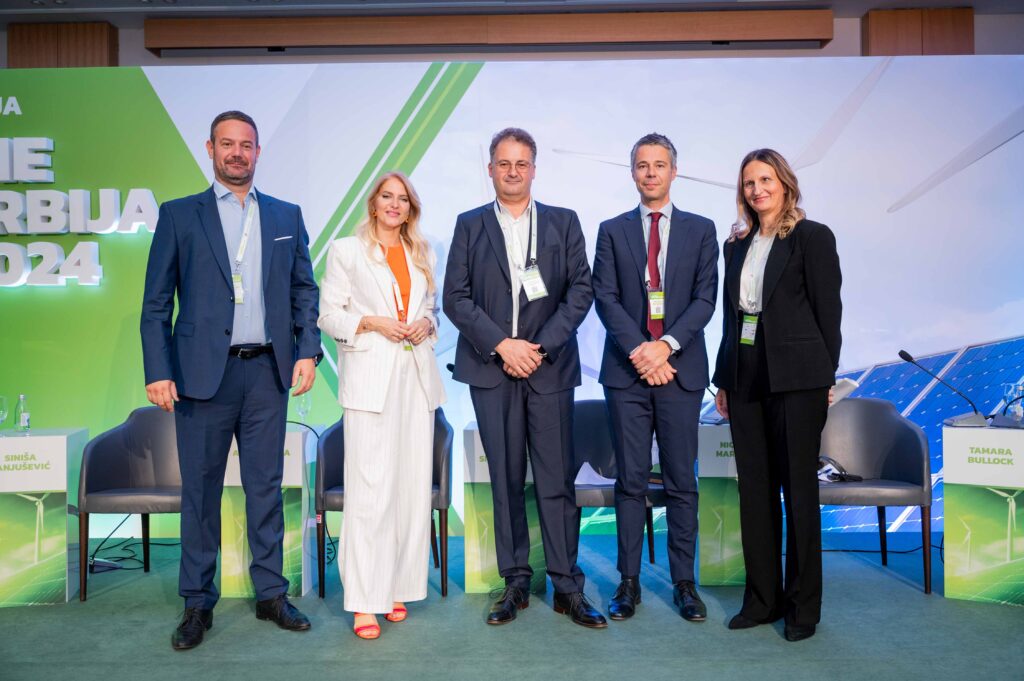What will the greenest BMW facility in Europe look like, can the Western Balkans be decarbonized without sacrificing economic growth, when batteries for electric vehicles will be able to last 2000 kilometers – these are just some of the topics discussed at the panel ‘E-mobility and sustainable development in transport. Sustainable development as a basic principle of responsible industry’ held at the RES SERBIA 2024 conference in Vrdnik.
The moderator of the panel was Tamara Bullock, Director of Corporate Affairs for Europe and Americas at Tetra Pak, and the panelists were Aleksandra Đurđević, CEO fo Delta Auto Group, Nicolas Marquier, Regional Manager for Western Balkans at IFC, Srdan Srdanović, Head of Smart Infrastructure at Siemens Serbia, and Siniša Janjušević, Country Manager in Interenergo Serbia.
The panelists concluded that Serbia is still at the back of Europe when it comes to the purchase of electric cars, and the prerequisite for the development of this market is the infrastructure, which is insufficiently developed with three chargers per 100,000 inhabitants.
The panel was held under the auspices of the World Bank’s IFC Group, the world’s largest global development institution focused on the private sector of emerging markets.
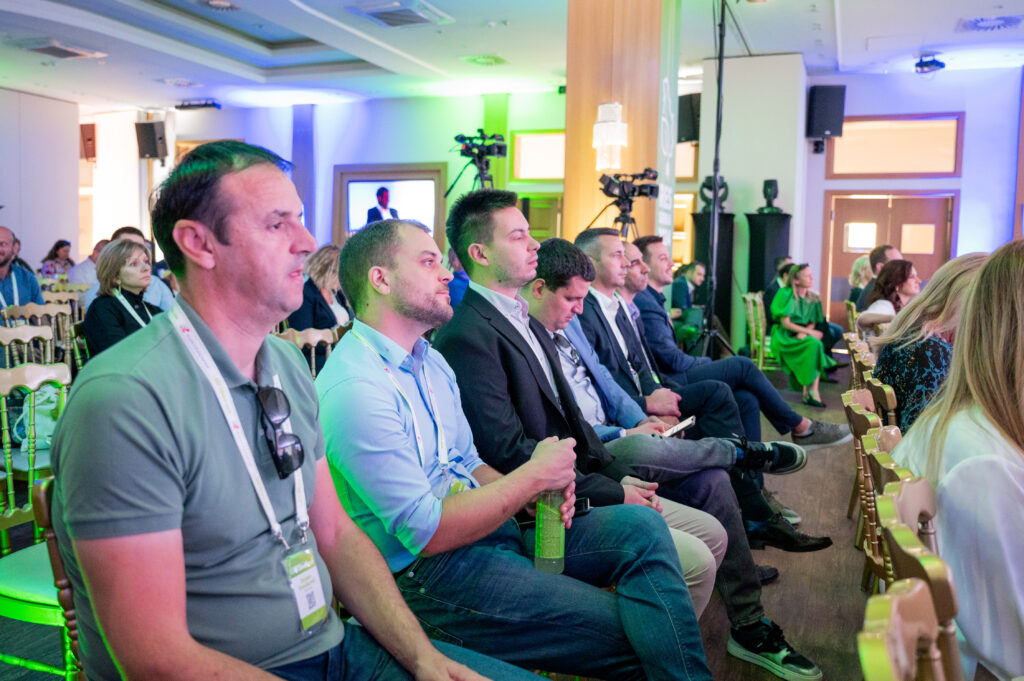
Companies that export to the EU should pay attention to ESG
Nicolas Marquier, Regional Manager for Western Balkans at IFC, reminded that the International Finance Corporation (IFC) has launched a pilot project of eco-industrial parks in five cities in the Western Balkans, aimed at decarbonization and improving resource efficiency.
– Kragujevac is one of them. The Western Balkans are benefiting from the ‘nearshoring’ trend. The advantage of Serbia and the Western Balkans is that you are close to the EU and that you have funds that you can use. There is a lot of progress in the region, but it is not going fast enough, in the green economy there are jobs of the future for the citizens of Serbia, factories, manufacturers – said Marquier.
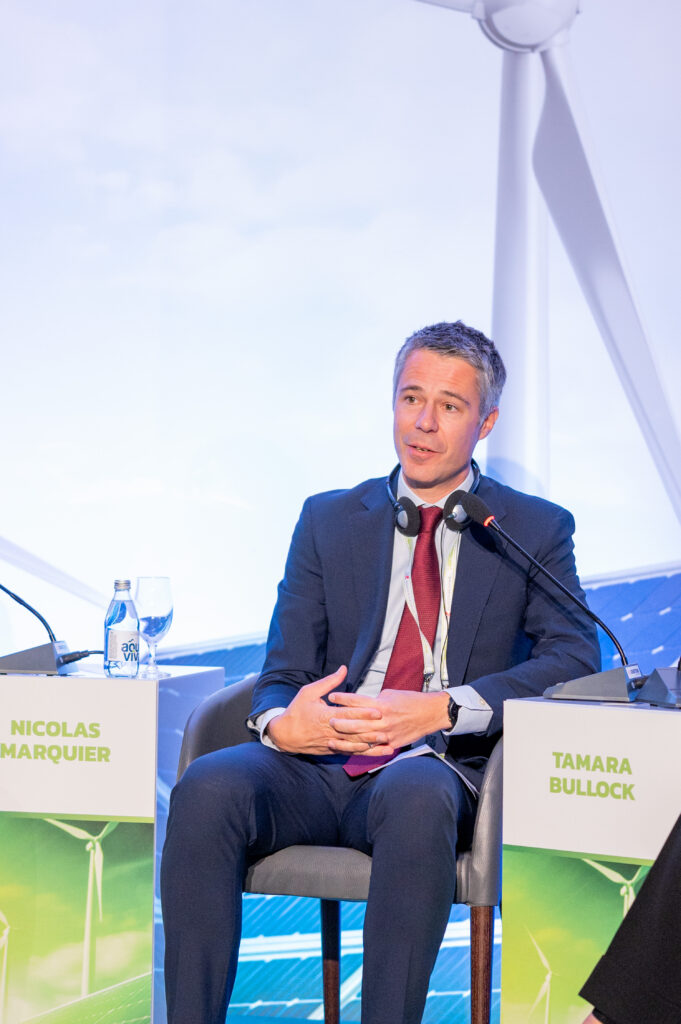
Nicolas Marquier, Regional Manager for Western Balkans at IFC
He reminded that the EU was increasing regulations in the ESG system and that it was crucial for exporting companies to pay attention to those criteria. And, as he noted, 60% of the region’s exports are to the EU. According to him, economic growth still correlates with increased emissions and that should be changed.
– According to the World Bank report for the Western Balkans, it is possible to reach net zero by 2050, without sacrificing growth. It is necessary to invest EUR 32 billion a year in climate transition, which is 2% of the GDP of the region – pointed out Marquier and added that 85% of the investments needed to come from the private sector, whereas the region was dominated by state companies.
What are Eco-Industrial Parks?
The project Eco-Industrial Parks (EIP) in the Western Balkans is a collaborative effort between the European Commission (EC), the Western Balkans Investment Framework (WBIF), the International Finance Corporation (IFC) and industrial parks selected as EIP pilots. This collaboration is part of the broader EU Economic and Investment Plan for the Western Balkans 2021-2027, reflecting a commitment to fostering sustainable development, regional cooperation and the region’s EU integration aspiration.
The project aims to initiate the implementation of the EIP concept in five EIP pilots in the Western Balkans, helping protect the environment and foster broader national reforms concerning industrial decarbonization. This innovative approach to industrial development integrates social, economic, and environmental considerations into the park's planning, management, and activities, aligning with the principles of sustainability and industrial decarbonization. For this purpose, the IFC intends to provide technical support to selected industrial parks management in developing the capacity for providing shared services to its tenants and to enhance the capabilities of companies within the park to meet Eco-Industrial Parks' prerequisites and operational standards.
IFC is currently finalizing a cooperation agreement with Mind Park in Kragujevac as one of the Eco-Industrial Parks pilots on the project. They are also in the process of singing cooperation agreement with several other industrial parks’ operators and developers to enter the project as the Eco-Industrial Parks Pilots, including greenfield projects, in Serbia, North Macedonia, Bosnia and Herzegovina, Albania, Montenegro.
The project’s additional focus is on the reform process to facilitate the broader uptake of the Eco-Industrial Park concept in cooperation with the state representatives. The lack of sound regulatory and policy frameworks renders industrial park operators' everyday operations unnecessarily difficult, undermining the industrial parks' full potential to support overall economic development and positive spillover effects on the broader economy. Therefore, in cooperation with the state stakeholders, the IFC intends to provide technical assistance in supporting regulatory and policy reforms to improve industrial parks' business environment and maximize the positive spillover effects of EIPs on the broader economy.
Share of electric cars in total sales 1.5%
CEO of Delta Auto Group Aleksandra Đurđević recalled that the first electric BMW had been imported 7-8 years ago and the reactions were of the type “as if we had brought over a flying car.” Today, the share of electric cars in the total sales is 1.5%, whereas in Europe it’s 13%.
– The topic is very current globally, and we are at the bottom of the list in Europe. The trend is for the second car in the household to be electric. It’s fun, quick to start, interesting to ride – pointed out Đurđević.
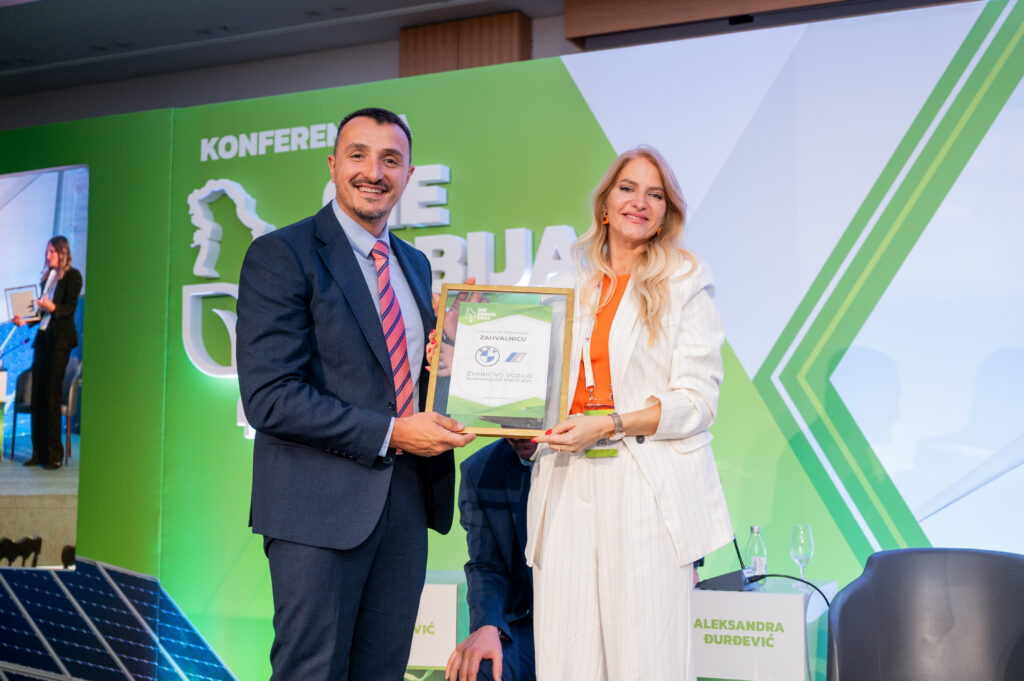
Miloš Colić and Aleksandra Đurđević
According to her, the first pillar of the development of electric cars is infrastructure. As she says, in Europe as well, there’s a fear that the vehicle will not have enough energy to reach the planned destination.
– We have talked to the minister of infrastructure, by the end of the year, 30 chargers for electric cars on road routes of Serbia have been announced. So far, we have been at three chargers per 100,000 citizens, which is very few – warned Đurđević.
She also emphasized the importance of subsidies, which, she says, should have a bigger continuity and it should be known precisely how much money is meant for them, so that the buyers could plan the purchase and so that the importers would not be left with unsold vehicles.
– The production of these vehicles is more expensive, it takes time. The importers have to invest a lot too, maintaining these vehicles is different than with traditional ones. There is talk about batteries which will last for 200 km, which are a game-changer for the industry, but that’s not the reality yet – emphasized Đurđević.
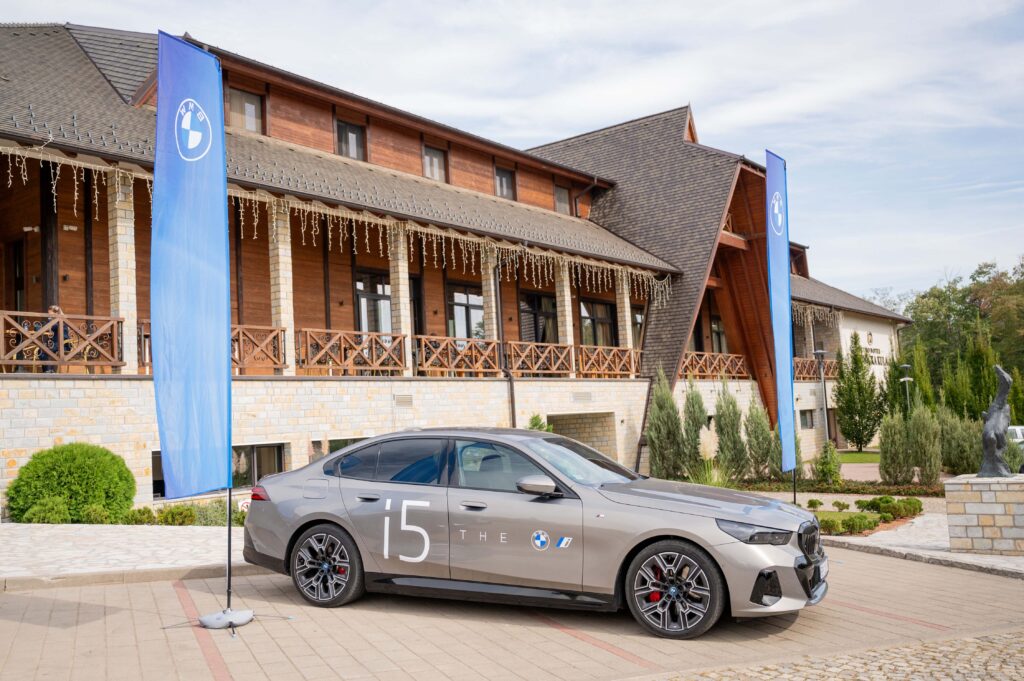
She also mentioned that the company was building a multi-brand auto salon of 17,000 m2 in New Belgrade, based on sustainability principles. Material obtained through the recycling of three facilities is used in the construction, and solar panels will be installed as well, which will produce 130,000 kWh of electrical energy per year, whereas the process of water treatment enables the reuse of around 200 to 300 liters of water per car wash.
– It will be the greenest BMW facility in Europe. For us, one of the strategic priorities is to be ESG leaders – said Đurđević.
Siemens’ entire fleet will be electric by 2030.
Srdan Srdanović, Head of Smart Infrastructure at Siemens Serbia, points out that by 2030, the entire fleet in Siemens will be electric.
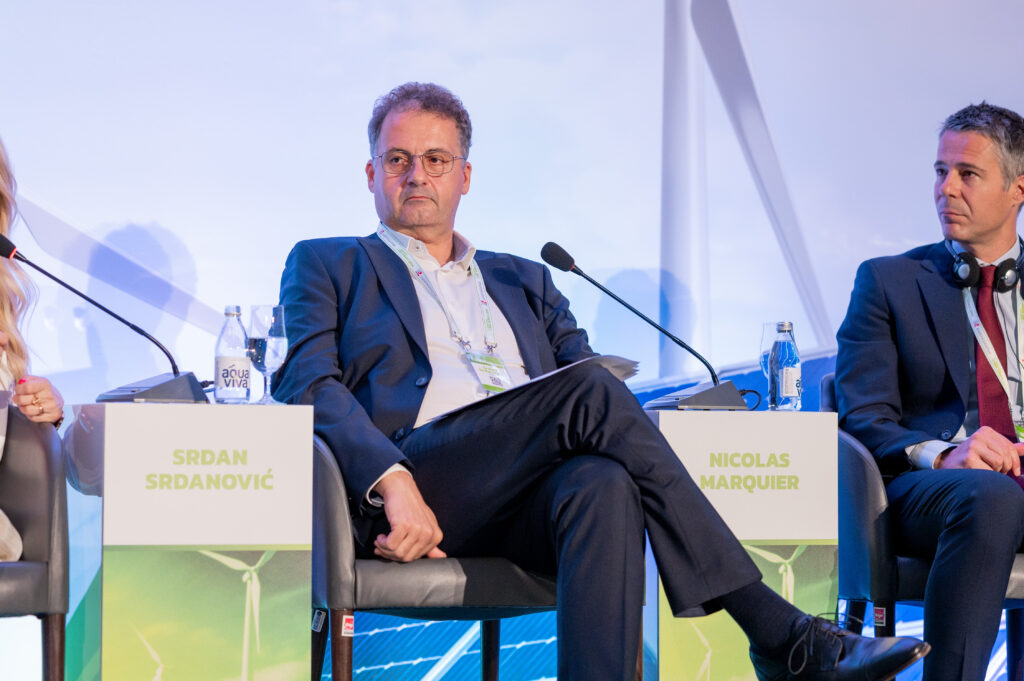
Srdan Srdanović, Head of Smart Infrastructure at Siemens Serbia
– We have already procured two vehicles, and the feeling is like riding on a cloud. But we can’t expect somebody to stand behind the development of the network if there are no vehicles, and a 1.5% share is truly small. Our comfort zone has become narrow, if we don’t have 3 gas stations at 150 meters, we don’t want to drive. We need to evolve, we should move from ego to eco, that is my appeal to everybody – said Srdanović stressing that Siemens partners will also need to reduce CO2.
Interenergo: Next year the first wind farm in Serbia
Siniša Janjušević, Country Manager in Interenergo Serbia, said that this company has produced over 5 GW of electricity through various energy efficiency projects, from public lighting, through the production of energy from biomass to prosumers.
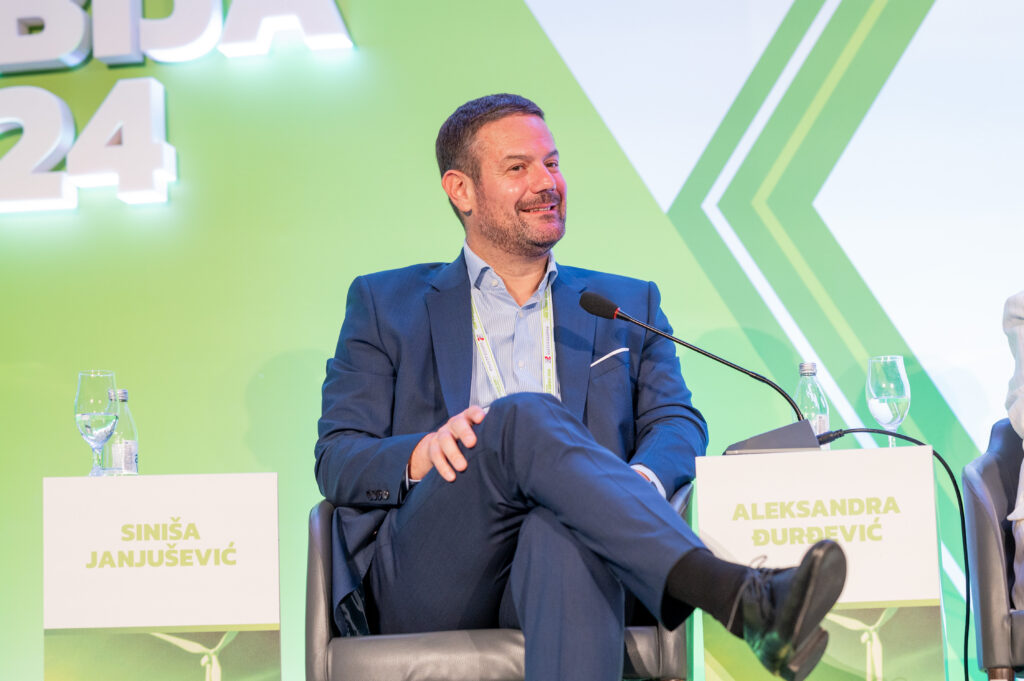
Siniša Janjušević, Country Manager in Interenergo Serbia
–We operate two wind farms, in Croatia and Bosnia and Herzegovina. Next year we will present the first wind farm in Serbia. We are working a lot on solar, although it is in an investment crisis as far as the purchase price is concerned, but that will change, as it has changed in Slovenia and Croatia – noted Janjušević.
You can watch the full panel recording below:


